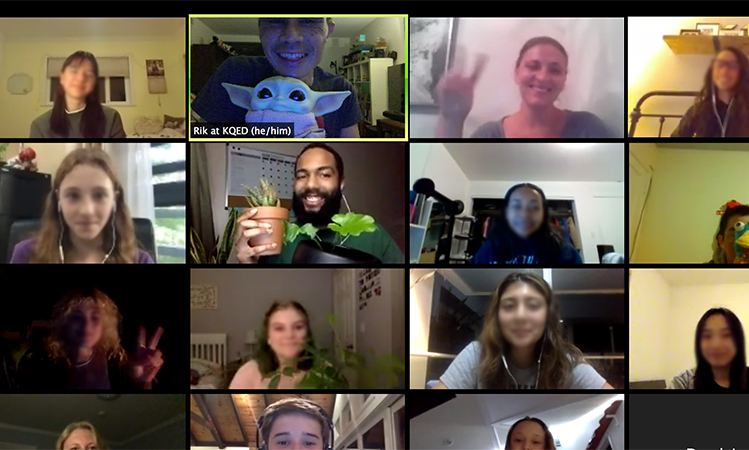So 2020 was of course not the year that anyone expected it to be. I feel very fortunate that I continue to be gainfully employed at an organization that values my work and that serves a vital need in this time of multiple crises.
Here’s some of my professional highlights from 2020.
Working from Home Doesn’t Suck that Bad

I have to admit that I was not looking forward to transitioning from working in a traditional office to working exclusively from home. While I cherish the occasional work away from work, I have not had great experiences with working remotely for long stretches of time.
In my experience, after the initial honeymoon of 4-8 weeks, I start to get unmotivated and depressed about working alone. I thrive on the juice of being around my colleagues, the buzz of a busy office, the ineffable connections and energy I get from the social construct of work life.
But I was surprised by how this time working from home has not been that bad, and actually been largely enjoyable. A lot of this has to do with the differing context of working from home. I’m still connected to a group of dedicated and passionate set of professionals, even if mediated by technologies like Slack, Zoom and email. I have a supportive work environment and leadership that has made our psychological well-being a priority.
Has my productivity gone down? Probably. But not as much as I would have anticipated. And I’ve largely adjusted to this new reality.
That said, I can not wait until I can return to my actual workplace, particularly since we are still slated to re-open our refurbished headquarters sometime in 2021!
Our Media Literacy Education Work Has Been Booming

My main program that I manage is the PBS Media Literacy Educator Certification by KQED. This initiative seeks to support teachers in integrating media literacy education in their work, including helping students to spot misinformation, analyze the media they consume, and create their own media to express themselves.
Launched a couple of years ago, by 2019, we were averaging about 24 submissions a month for the micro-credentials that lead to certification. Starting in January 2020, we saw a rapid increase in teachers applying for and earning certification, average 66 submissions per month in 2020! A three-fold increase!
It looks like the pandemic and resulting switch to remote learning across America was spurring many teachers across all grades and subjects to more deeply integrate media making into their teaching practice. Suddenly lots of teachers had to get good at shooting video lessons, making engaging graphics, and assigning media projects to their students learning remotely.
I’m so proud of the thousands and thousands of teachers who have made the rapid adjustments necessary to keep the learning going for their students, no matter what. And the PBS Media Literacy Educator Certification is one way to honor them for their hard work.
In 2020, we certified 34 educators from across the country, from a Spanish teacher in San Jose, CA to a music director in Boise, Idaho. Over 700 micro-credentials have been given out to 262 educators so far.
And we are poised for more growth in 2021 as several PBS stations are launching their own local media literacy academies, building off of work done by KQED, PBS Idaho, and PBS Montana.
Teachers Turning to KQED to Learn How to Make and Teach Media

Similar to the increase in teachers working toward the PBS Certification, we have also seen a huge jump in teachers taking our courses on KQED Teach, our own professional learning platform that offers free online courses for teachers on media literacy.
In the Spring of 2020, we launched the KQED Media Academy for Educators, a set of four instructor-led courses that prepare educators to effectively and meaningfully analyze, evaluate and make media with students to support curriculum goals. This new suite of courses brings together everything we have learned in the professional learning team over the past four years about how to support teacher learning.
To date, we have had 2000+ teacher registrations in our Media Academy courses. Each of our courses have enrolled hundreds of teachers, a huge jump from the more modest numbers we’ve supported in the past in our instructor-led courses.
It’s been awesome shepherding along cohorts of teachers in their journey during these three- and six-week courses. Seeing them move from being hesitant about video production, media analysis, and manipulating graphics to confidently making and teaching about media is just the best.
Teaching Teens Again in the KQED Youth Advisory Board

I love working at KQED. But one part of my previous positions I miss is getting to work directly with young people.
So in Fall 2020, I was excited to get asked to facilitate the new cohort of the KQED Youth Advisory Board, a group of 16 Bay Area teens who provide feedback to KQED producers on various projects.
That said, like other educators, I had to rapidly switch from in-person teaching to leading sessions with teens over Zoom. A great example of “eating your own dog food”! Coming up with a fun ice-breaker that works over a video conference is tough.
Luckily, this group of teens has been a dream to work with — dedicated, inspired, funny, and diverse — largely due to the work of my colleague Teresa in managing the program and the previous facilitator Chanelle who left earlier this year.
Fighting Election Misinformation and Promoting Civic Dialogue

I am always proud to work at KQED. But this year in particular with horrifying violence against Black people and the resultant calls for racial justice, a contention election like no other, and a global pandemic, I could not have felt more pride in the work of my colleagues at KQED.
Our education team did our part to spread vital knowledge and support teachers in this difficult time. We adapted our online courses, organized webinars, wrote blog posts, and spoke at dozens of conferences and symposia. Meanwhile, the youth media team inspired hundreds and hundreds of media pieces by young people sharing their views on the issues that matter to them — from gun violence to climate change to a woman’s right to choose.
I’m particularly proud of our course on Analyzing and Evaluating Media in the Classroom, that focuses on helping teachers to learn how to understand media production choices and to effectively evaluate online information like a professional fact-checker. Seeing teachers apply this to how they teach their students how to spot election misinformation and to more deeply understand the racial issues in America was so inspiring.
Meeting with My Mentors

For the past six years or so, I’ve been meeting with my friends and colleagues Barry and Eve about once a month to support each other’s professional growth and journeys. Despite so many changes in our work situations over that time, we’ve been consistently holding each other up and pushing each other to do better.
This year was one of the most challenging yet. I don’t know what I would have done without Barry and Eve in my life. With their help, I’ve developed my skills in presenting data in ways that drive clear decision-making, built up my own “brand” both within and outside the organization, and confronted my fears and anxieties about the election.
Presenting In Person and Virtually
I love getting to talk about the work to other colleagues in related organizations. While for 2020 the typical conference season was totally thrown into disarray, I was still about to participate and present at several important conferences and events.
NETA Convening in DC, January 2020

The year kicked off with a bang: the NETA Annual Conference in January in Washington DC. NETA (National Educational Telecommunications Association) is a convening body for public media stations and the educational work that they do around the country.
I was pleased to get to co-organize a pre-conference session for about 30 folks on the PBS Media Literacy Educator Certification, alongside folks from NAMLE, PBS National, Montana PBS, and Idaho Public Television. It was a cool experience talking about the PBS Certification to a bunch of awesome public media folks, and really got our year off to a powerful start.
100Kin10 Convening, NYC, February 2020

100kin10 is a nationwide coalition focused on the laudable goal of catalyzing 100,000 STEM educators in ten years. As part of that effort, I was invited to join a working group on micro-credentials, given my work on the PBS Media Literacy Educator Certification by KQED.
I was thrilled to be able to join a 100kin10 convening in New York City in February 2020. Seeing an effective nationwide coalition in action was thrilling to see and be a part of. And hopefully my small efforts has helped them get closer to their goal.
ISTE 2020
The ISTE 2020 conference was my last major presentation of the year. The International Society for Technology in Education is one of the largest convenings of folks working at the intersection of education and digital technology, from schools to museums to research institutes.
It was bittersweet, since this was going to be my first chance to attend ISTE in person, after hearing about it for years. The original plan was for my colleagues Rachel, Ilana and I to be at ISTE in June 2020 in Anaheim. Anaheim, as you know, is the home of one of my favorite places, Disneyland!
But lemonade and all that! I ended up organizing a virtual poster session on the PBS Certification that was very well attended. Poster sessions, as you may know, are typically a bit of a mixed bag. Sometimes you get a huge response from conference attendees, busily making connections, networking and flying the flag of your work. Or poster sessions can be an incredibly boring, frustrating experience, standing beside your carefully created poster, just praying that at least one person stops by to read it and talk to you.
This virtual session actually turned out to be in many ways much easier than a real world one. There was nowhere I had to travel to, all the graphics and media on the “poster” were entirely digital. And all I had to do to participate was log-in to the conference website a few minutes before my session time and chat with folks for about an hour.
Here’s the promo video I made for our poster.
We had a great turn out of about 50+ folks who were very engaged and excited about the program. So definitely worth the small effort it took to organize.

